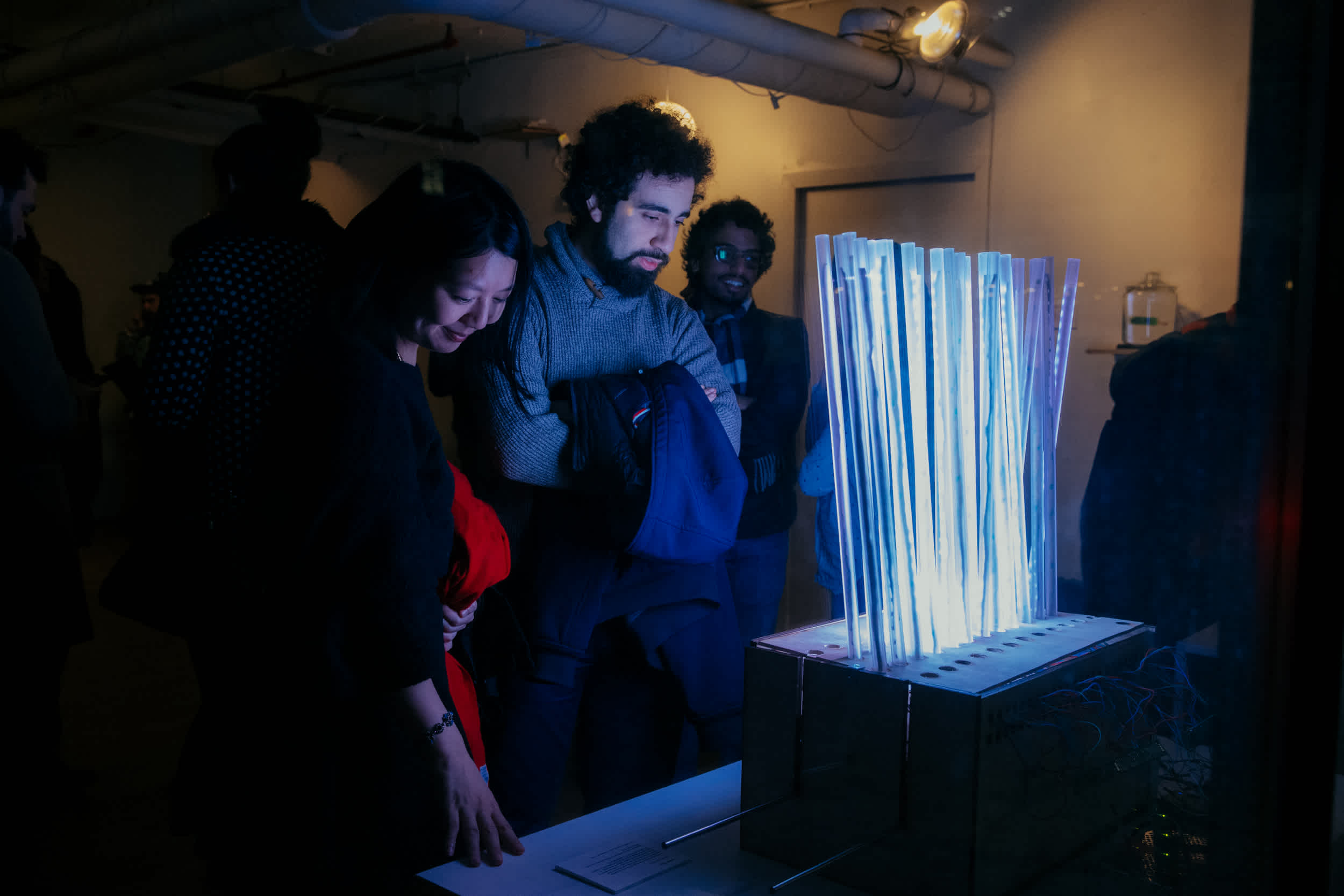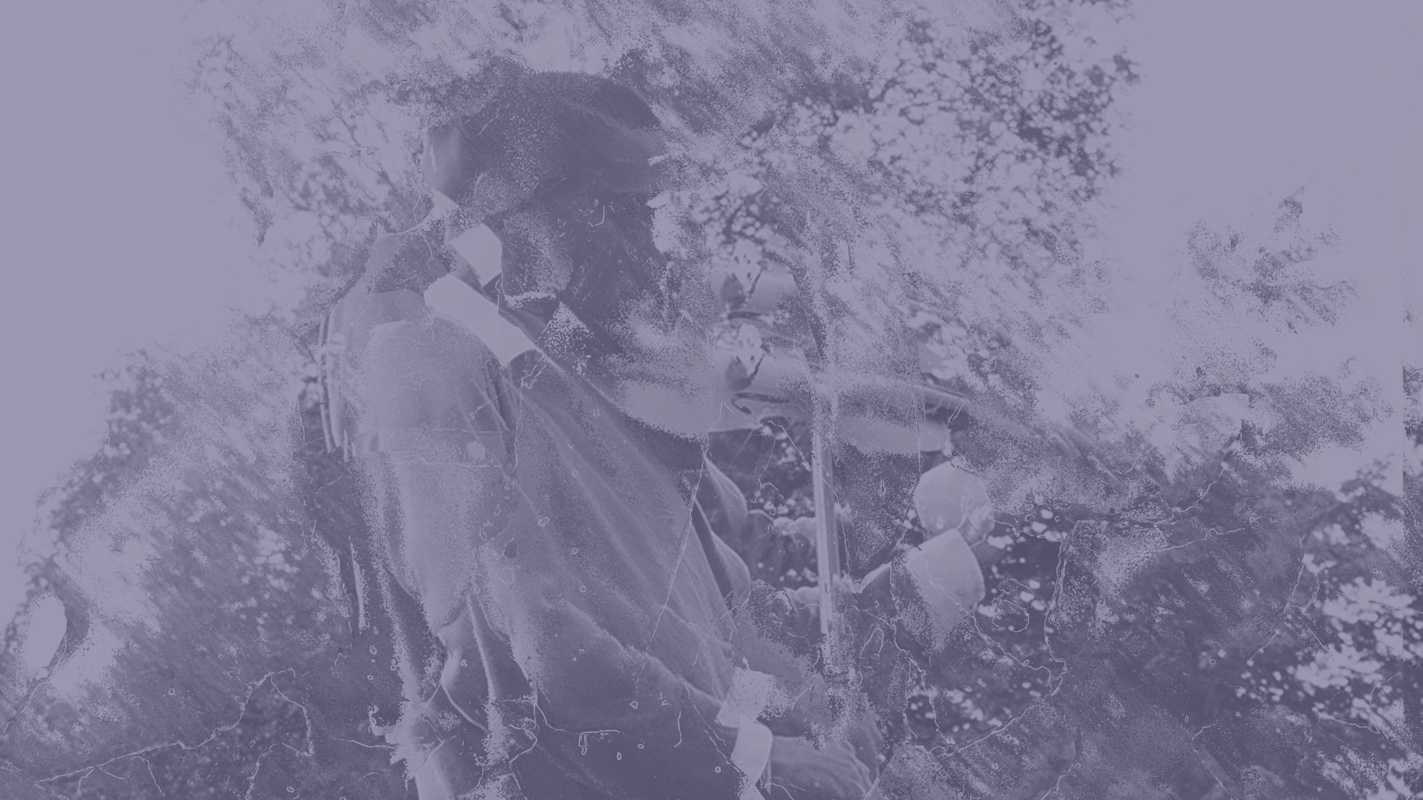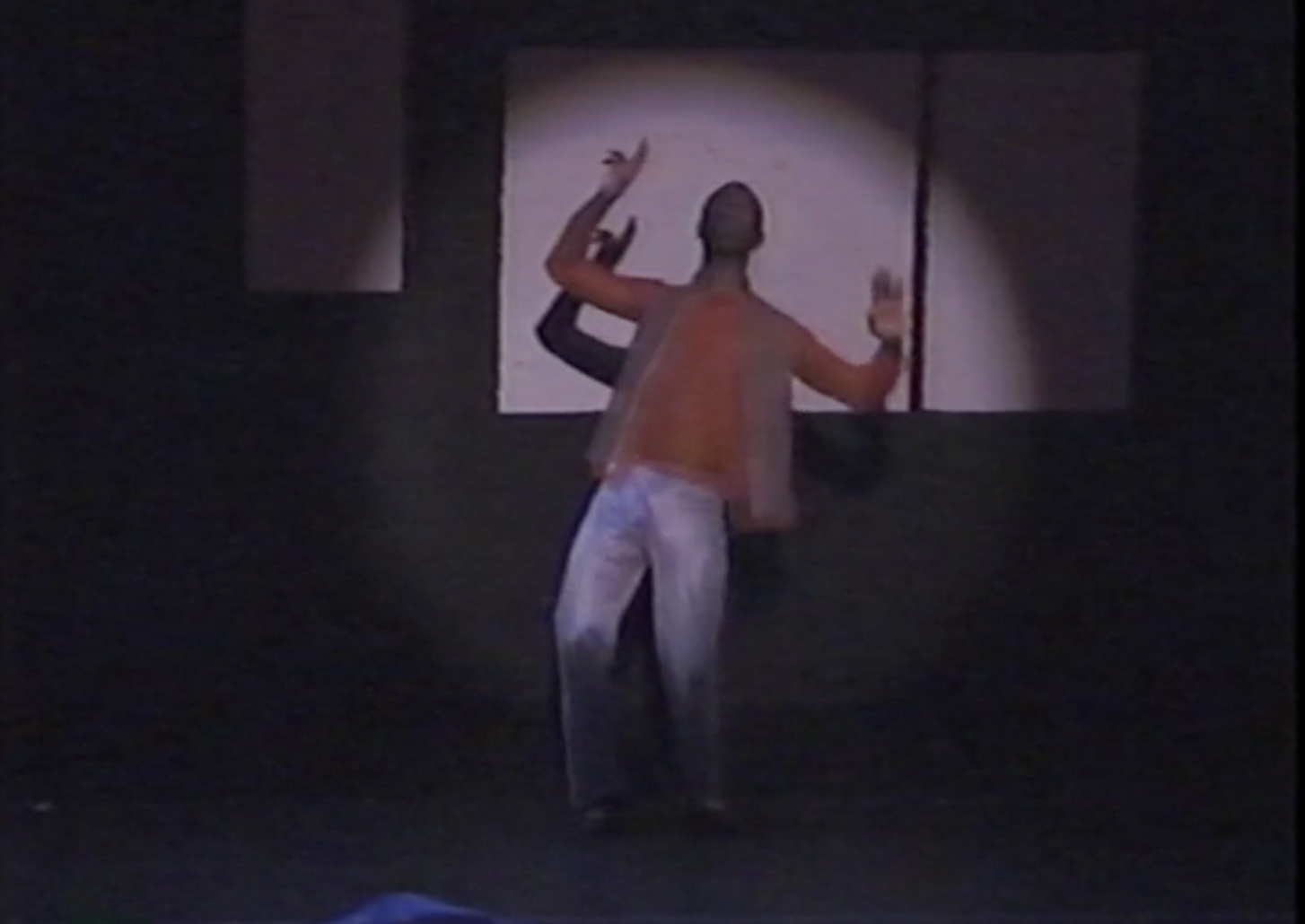
On View: August 2-September 30, 2023
The Kitchen at Westbeth (163B Bank Street, Fourth Floor Loft) and Offsite Locations
Through support from the Simons Foundation, The Kitchen’s 2022–2023 L.A.B. Research Residency pays homage to The Kitchen’s new media roots by partnering with the collective-in-residence School for Poetic Computation (SFPC) to explore the histories of art, science, and technology represented in the institution’s archive. To guide this collective investigation, The Kitchen and SFPC have worked together to form four Research Groups comprising Primary Researchers and Advisors to pursue research inquiries related to the thematic "Instruments of the Black Gooey Universe"—a concept that proposes that "instruments" drawn from critical theory, electronics, and networked performance practice can be deployed to probe and counter the opaque world of computing and the racial biases embedded within computational systems.
“Instruments of the Black Gooey Universe” is inspired by extracurricular connections between two recurring SFPC courses: Dark Matters, a critical theory class taught by American Artist that investigates the surveillance of Blackness and the construction of whiteness as “neutral” within high technology, and Hardware, a hands-on electronics class taught by the collective CW&T (Che-Wei Wang and Taylor Levy). Since fall 2022, members of the Research Groups have been engaging with The Kitchen's archive of performance recordings, program ephemera, posters, oral histories, and more to glean precedents for how artists and programs throughout the institution's history have confronted "the Black Gooey Universe."
In August and September, this cycle of the L.A.B. Research Residency will culminate with a series of in-person and online programs organized by Primary Researchers Lillian-Yvonne Bertram, fields harrington, Romi Ron Morrison, and Asha Tamirisa. One set of programs will take part in partnership with Montez Press Radio: four episodes of a discussion series between the Primary Researchers and invited guests called "Instruments of the Black Gooey Universe On Air." This slate of programs will unfold as an intersection with Montez Press Radio's own 12-month residency with The Kitchen. Primary researchers and advisors will host four radio segments drawing out themes including influence and the avant garde, approaches to sonic improvisation, the boundaries between reproduction and repetition, and more. This series of episodes will broadcast on radio.montezpress.com, and will be archived for future listening on The Kitchen's website. Select segments will be recorded on site with live audiences at Montez Press Radio’s Canal Street headquarters. Information on the radio series and additional programs organized by the Primary Researchers will be announced later this summer.
The Research Groups for the 2022–2023 L.A.B. Research Residency include Primary Researcher Lillian-Yvonne Bertram with Advisors Melanie Hoff, Erik Loyer, and Eileen Isagon Skyers working with Bertram; Primary Researcher fields harrington with Advisors Zainab Aliyu, mayfield brooks, and Sebastián Morales Prado; Primary Researcher Romi Ron Morrison with Advisors Neta Bomani, Ryan C. Clarke, and Mendi Obadike; and Primary Researcher Asha Tamirisa with Advisors Galen Macdonald, Chakeiya Richmond, Tiri Kananuruk. Three additional artists—American Artist, Taylor Levy, and Che-Wei Wang—are participating as General Advisors to offer feedback across all four Research Groups.
The Kitchen L.A.B. Residency x Simons Foundation, in partnership with School for Poetic Computation Co-Directors Zainab Aliyu, Todd Anderson, American Artist, Neta Bomani, Melanie Hoff, Galen Macdonald, and Celine Wong Katzman, is organized by Legacy Russell, Executive Director & Chief Curator and Alison Burstein, Curator, with Angelique Rosales Salgado, Curatorial Assistant, and Daniella Brito, The Kitchen L.A.B. Research Residency x Simons Foundation Fellow.
BIOS
The School for Poetic Computation is an experimental school in New York that was founded in 2013. Our school supports interdisciplinary study in art, code, hardware and critical theory. It is a place for unlearning and learning. Our programs challenge the capitalistic, heteronormative and patriarchal canon of social and computer sciences. SFPC attracts self-motivated creative thinkers and radical teachers. All participants are treated as collaborators and we formally encourage the power of learners to determine their experience & education. The unique culture of our institution is one based on communal care and solidarity across social differences. This pedagogical space framed in intimacy ideally allows for participants that are LGBTQIA+, Black, Indigenous, and/or Disabled to feel empowered that their ideas are important, necessary and central.
Lillian-Yvonne Bertram is the author of the forthcoming poetry collection Negative Money (Soft Skull, 2023), and the poetry collection Travesty Generator (Noemi Press, 2019), winner of the 2018 Noemi Press Poetry Prize and finalist for the National Poetry Series. Travesty Generator received the 2020 Poetry Society of America Anna Rabinowitz Prize for interdisciplinary and venturesome work. They are also the author of Personal Science (Tupelo Press, 2017); a slice from the cake made of air (Red Hen Press 2016); and But a Storm is Blowing From Paradise (Red Hen Press, 2012), chosen by Claudia Rankine as the winner of the 2010 Benjamin Saltman Award. Bertram’s other publications include the chapbook cutthroat glamours (Phantom Books, 2012), winner of the Phantom Books chapbook award; the artist book Grand Dessein (commissioned by Container Press), a mixed media artifact that meditates on the work and writing of the artist Paul Klee and was recently acquired by the Special Collections library at St. Lawrence University; and Tierra Fisurada, a Spanish poetry chapbook published in Argentina (Editoriales del Duende, 2002). They collaborated with the artist Laylah Ali for the exhibition booklet of her 2017 art show The Acephalous Series.
fields harrington is an artist who lives and works in Brooklyn, NY. He works across disciplines and media to investigate the social and political dimensions of race, value, and the complex history of science. harrington studied at San Antonio Community College and received his BFA from the University of North Texas and his MFA from the University of Pennsylvania. He was a participant in the Whitney Independent Study Program (2019–2020). He has presented solo exhibitions at David Salkin Gallery (2020) and Y2K Group (2021). He has also exhibited in group shows at Parsons S in chool of Design, Recycled Artist In Residence, 52-07 Flushing Avenue, and Automat Gallery. He participated in the research residency Site to be Seen at RAIR (2021), and teaches at Eugene Lang College of Liberal Arts at The New School, Parsons School of Design, and The Cooper Union.
Romi Ron Morrison is an interdisciplinary artist, researcher, and educator. Their work investigates the personal, political, ideological, and spatial boundaries of race, ethics, and social infrastructure within digital technologies. Using maps, data, sound, performance, and video, their installations center Black diasporic technologies that challenge the demands of an increasingly quantified world—reducing land into property, people into digits, and knowledge into data. Romi has exhibited work and given talks at numerous exhibitions, conferences, and workshops around the world including Transmediale (Berlin), ALT_CPH Biennial (Copenhagen), the American Institute of Architects (New York), Museum of Contemporary Art (Chicago), Haus der Kulturen der Welt (Berlin), Queens Museum (New York), and the Walker Museum of Art. They have been in residence at Eyebeam Center for Art + Technology, New York University (ITP), The Joan Mitchell Foundation, and FemTechNet. Their writing has appeared in publications by MIT Press, University of California Press, Catalyst: Feminism, Theory, Technoscience, and Logic Magazine. They have taught courses at Parsons School of Design and the University of Southern California (USC). They are currently an Annenberg PhD Fellow in the School of Cinematic Arts at USC in Los Angeles.
Asha Tamirisa is an artist and researcher, primarily working with sound and video in performance and installation. Her work often explores matereality and metaphor, history and archives, and gender and technology. Asha holds a Ph.D. in Computer Music and Multimedia and an M.A. in Modern Culture and Media from Brown University, and has taught at Street Level Youth Media, Brown University, RISD, and Bates College.
FUNDING SUPPORT & CREDITS
The Kitchen L.A.B. Research Residency is generously supported by the Simons Foundation, whose mission is to advance the frontiers of research in mathematics and the basic sciences. The Foundation’s Science, Society and Culture division seeks to provide opportunities for people to forge a connection to science—whether for the first time or a lifetime. Through their initiatives, they work to inspire a feeling of awe and wonder, foster connections between people and science, and support environments that provide a sense of belonging.
The Kitchen’s programs are made possible through generous support from annual grants from Bloomberg Philanthropies, Helen Frankenthaler Foundation, Howard Gilman Foundation, The Andrew W. Mellon Foundation, Mertz Gilmore Foundation, Simons Foundation, Ruth Foundation for the Arts, and Teiger Foundation; and in part by public funds from New York City Department of Cultural Affairs in partnership with the City Council and New York State Council on the Arts with the support of the Office of the Governor and the New York State Legislature.



